 le 6 au 10 mars 2023
le 6 au 10 mars 2023 
Upcoming Dates
- Week of 3/6: Artists in Residence
- March 3-12: Read-athon! Bring in donations and reading logs after 3/13
- Thursday, March 9: Pajama Day! (Celebration for having corrected 200 French sentences.)
- Saturday, March 11: OBOB Regional competition @ South Eugene High School from 9:00am – 2:00pm – support the fourth-grade winning team
- Tuesday, March 14: Field Trip to South Eugene High School for a music event. Please turn in forms!
- Friday, March 17: NO SCHOOL, Workload relief day
- Monday-Friday, March 27-April 3: NO SCHOOL, Spring Break!
Read-a-thon happening now!
The PTO just launched our next school-wide fundraiser, Read-a-thon. Money from this fundraiser helps, in part, to bring our invaluable French Interns to campus.
Your student(s) brought home pledge packets* last week. On the back they can track the minutes they spend reading. All types of books are fair game, any amount of time qualifies, including being read to by you or a family member.
-
Reading Window is March 3rd – March 12th
-
Reading Log/ Envelope Return Window is March 13th – March 20th
-
* If your family chooses to collect donations, please bring the collected money with their logs, starting March 13. The PTO will provide a celebration for the class with the highest participation of students turning in reading logs. Contact Emily at ec_steel@yahoo.com if you’d like to volunteer.
What’s up! Quoi de neuf?
 Please send your child to school in proper footwear and a water-repellent jacket when the weather is threatening. Students will go out to recess unless the principal decides the weather prevents it. If your child is ill, or has had a fever or vomited within the previous 24 hours, please keep your child home. Please continue to follow current Covid rules as well. If your child will be absent, please email both teachers (kincaid_j@4j.lane.edu and hopper_s@4j.lane.edu) and please call in and leave a message on the school line (541) 790-7080 or for our secretary, Eliza Drummond, at drummond_e@4j.lane.edu.
Please send your child to school in proper footwear and a water-repellent jacket when the weather is threatening. Students will go out to recess unless the principal decides the weather prevents it. If your child is ill, or has had a fever or vomited within the previous 24 hours, please keep your child home. Please continue to follow current Covid rules as well. If your child will be absent, please email both teachers (kincaid_j@4j.lane.edu and hopper_s@4j.lane.edu) and please call in and leave a message on the school line (541) 790-7080 or for our secretary, Eliza Drummond, at drummond_e@4j.lane.edu.
Le français:

•We speak exclusively in French during French class.
•We write in complete sentences and can identify many parts of speech.
•We are learning about symmetry and about telling time in French.
All students have completed their geography packet now, which we will keep at school for a bit to help us with our next social studies project, a francophone study.
We completed our study of the months of the year, the derivation of the names, and how they correspond to the order of the months, and the papers should either have already come home in student folders or will be coming home soon. Ask your child to explain to you what they learned about the calendar.
We will have corrected 200 sentences in French class this Thursday, so we’re having a pajama day!
This week, we will be exploring line symmetry and radial symmetry, first in nature, then in maths. We’ll also begin time-telling in French, which is similar, but, of course, different!
 We began our latest art project, which involves writing your name right-side up, then in translation, around a circle. It ends up looking like a piece of stained glass. Many students have completed their rough drafts, and a few students have begun their final copy.
We began our latest art project, which involves writing your name right-side up, then in translation, around a circle. It ends up looking like a piece of stained glass. Many students have completed their rough drafts, and a few students have begun their final copy.
This week’s French homework is a variety of words that students often misuse or misspell. Here is a copy: mots variés mars 2023 l Vocab We did our quiz on our Energy vocabulary on Thursday and most students did quite well; the average grade in both classes was 93%, and I gave them a lot of prep, so if your child did worse than that, he/she/they may need to study more next time, or at least not wait until during the quiz to ask me what a vocabulary word means…
Les sciences:
We began our new science unit, Energy (l’Énergie) with a discussion of what they already know about energy, in general. We did our first experiment this week which was students trying to figure out how to light a small bulb with a battery (une pile) and one or two electrical wires (un fil électrique). We also discussed and labeled a cutaway model of an incandescent bulb. We have discussed and will continue to discuss circuits, open and closed, and insulators and conductors of electricity in the coming weeks.
Artists in Residence:
Red class enjoyed two sessions of dancing this week, and blue class enjoyed two sessions of drumming. Next week, we switch! Here are some photos of both groups: 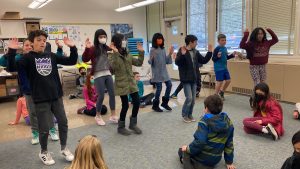
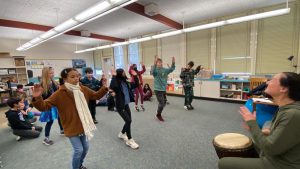
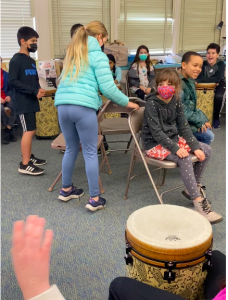
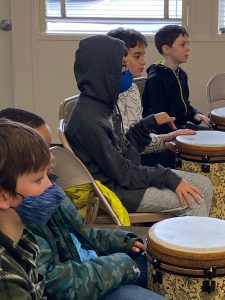
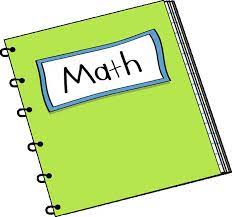

Mme Shelli, English & Math
hopper_s@4j.lane.edu
Math
Students will bring home their measurement conversion quiz sometime this week.
Next, we will spend a few days reviewing strategies for multiplying 3-4 digits by one digit numbers using the standard algorithm. Then, we’ll discuss some strategies for division of larger numbers, including numbers with remainders.
Probably late next week, we’ll start Unit 8: Solving Problems with Multiplicative Comparison. This unit asks students to model multiplicative stories with a bar model similar to this one. Modeling enables students to visualize what is happening in a problem, so they can determine if they will multiply and/ or divide to solve.
Here’s a few starter problems we will discuss. Notice how the stories have the same numbers, but have different meanings? Modeling these on a bar model can help students see the relationship of 4, 6, and 24 in each story.
- Alexa has six points. Oliver earned four times as many points as Alexa. How many points did Oliver score? How could you model this?
- Oliver has 24 points, and Alexa earned only six. How many times as many points did Oliver score compared to Alexa?
- Oliver has 24 points. He earned four times as many points as Alexa. How many points did Alexa score?
As part of this unit, we’ll be discussion strategies of division. One key strategy we use in 4th grade is partial quotient division. This strategy relates multiplication to division. Check out this link for a quick guide to this method which is probably different than how you learned division in school.
There is Math review homework this week.
English
Literature & Writing: Unit 2 Extreme Settings
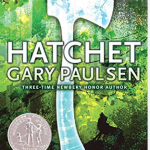 WordStudy: suffix endings & how they can change a base word
WordStudy: suffix endings & how they can change a base word
Reading/ Writing: We will finish Hatchet by Gary Paulsen the end of the week. s. As we continue the novel, we will talk about themes in the novel as they analyze how the main character changed.
Writing: Most students finished writing their survival narrative last week. They did some self editing and read them to peers on Friday. I will need a few days to give feedback to students before they make final revisions and drafts to bring home. Students are working on writing a complete narrative following a simple plotline, including sensory details, organizing their writing into paragraphs, and using correct punctuation and capitalization.
Information about this ELA unit can be found here.

Write a Comment
You must be logged in to post a comment.